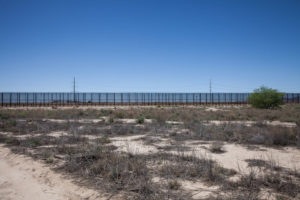Name Calling at the Border How Young Male Asylum Seekers Are Specifically Targeted

With news that another migrant caravan of some 1,800 Central Americans is making its way to the US border with Mexico, it’s necessary to remind people of the dangers of demonizing male refugees and asylum seekers. These dangers affect no only those making the heartbreaking choice to flee the countries of their birth but also native-born Hispanic and Latinx US citizens.
The politicization of male refugees and asylum seekers, especially young men in their twenties and thirties, by politicians and propagandists in the press is morally wrong and must end. For years, politicians and those who work in the media have dehumanized male refugees and suggested that their pain and their decisions to flee the countries of their birth to come to the United States are somehow less legitimate than the same pain and the same decisions made by women concerning themselves and their children.
This mischaracterization is often intended to motivate voters into supporting politicians who intend to make the lives of refugees harder and more dangerous. By claiming that male refugees are dangerous, politicians who promote intense border security measures position themselves as the only acceptable candidates. Meanwhile, evidence shows that immigrants are less likely to break laws than native-born citizens. The immigration system, however, profits off the fear of male refugees and masks itself in the rhetoric of strengthening the border. It then becomes easier to accept the idea that documented immigration should be reduced, as well as emergency immigration like asylum seeking.
Male refugees have been compared to and often called soldiers, drug dealers, and terrorists. This rhetoric actually has an impact on how likely Americans are to want to receive them. The act of lying about male refugees is morally reprehensible and should be condemned, not only by humanists but by people of all beliefs and all political positions. That fear-mongering is not reflective of the reality of the people, including men, who are risking their lives to seek asylum.
For generations, groups of asylum seekers coming to this country and, to a lesser extent, to Europe and elsewhere, have been treated better in the press if they are in groups that have a mixture of male and female refugees. Refugee communities are also generally seen as deserving of sympathy if they have children with them. This conditioning has an impact not only on the male refugees themselves, but also on middle school and high school students who are forced to endure public taunting and bullying simply because they are Hispanic. Young people are subjected to racism at the hands of fellow students, many of whom were likely emboldened by hateful rhetoric that can easily be found with simple Google searches or by watching the evening news.
Words matter and carry weight, especially when uttered by people with massive audiences (looking at you, POTUS). Words matter when they come from the lips of people who are routinely watched by millions.
The demonization of male refugees is one tactic to help justify family separation and to discourage people from fleeing situations where their lives are in real danger. It’s a rhetorical tool used to scare people into staying in places where their lives are endangered. Family separation doesn’t just occur at the border. It takes place in the homes of people who are forced to make the incredibly painful choice between staying in the countries of their birth or moving to another country to seek out the opportunities they’ve been told for so long are waiting there.
“Sticks and stones may break my bones but words will never hurt me” is an old expression often said to kids who’ve been bullied, but we now know that it just isn’t true. Words inflict pain that is still very real. Just because no bones are broken doesn’t mean that pain isn’t felt. Analyzing and understanding rhetoric is a necessary component for a thorough analysis of any modern-day ethical or political dilemma, especially a topic with such significant impact as immigration. It is time to speak up and speak out against the constant demonization of immigrants, especially young men. Stand up to those who want you and other voters to be afraid.
Speak up and speak out in defense of the voiceless. Don’t let people who inaccurately posit that male refugees are invaders, drug dealers, and soldiers be the only voices heard or seen online and in other mediums. It’s vital that those of us who are safe to do so speak out against the whirlwind of toxic propaganda that hopes to instill so many in our communities with fear. Silence assists those who hope to trick people into being scared, silence helps the loud trick people. Speak out and let your voice be heard. Share factual information about the conditions many refugees are fleeing, and the impact of their work on this country. Take the time to learn and share the complex stories of many refugees and their families.
